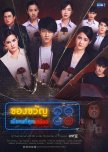
Cette critique peut contenir des spoilers
Nice BL that offers some lighthearted criticism of the industry
This is a cleverly made BL that knows the elements of a popular (and good?) BL and what bad BLs are like. It's also an understated satire or criticism of the BL industry while being a nice BL series in itself.The story of Gene and Nubsib is pretty good especially in the first half of the series. In the second half, I felt that the narrative threads that have been started were not really dealt with all that well (e.g. why Gene has such a strong reaction to Nubsib hiding the fact that they were childhood friends, why Nubsib forgives him quite easily and their parents' initial objections to their relationship). Some problems were resolved a little too quickly to make way for the good old Episode 11 crisis. Some practical constraints could have caused this since the creators are actually quite good at telling a story.
The series that Nubsib is filming in the story, Bad Enginner, is a mocking take on Thai BLs featuring engineering students (though I believe some of these are better than others). Some of the scenes in Bad Engineer (with Nubsib walking around and posturing with a few other engineering students) are reminiscent of what we see in some BLs but are so cringe-inducing that you begin to have an inkling of where the title is *Bad* Engineer.
The series also, in a rather understated and mild way, exposes the problems with the BL industry (well, actually the entertainment industry in general), including its fans. 2021 seems to be the year when the genre turns self-reflexive--I am reminded of Call It What You Want. Gene, who is the writer of the novel form of Bad Engineer, is a reluctant BL writer who keeps getting pressured to add sex scenes to his novels even at the expense of more important story-telling elements. Well, fans love it, the reasoning goes. Tiffy mentions to Tum some "curse" regarding the managers of BL actors in a series quarrelling (possibly a reference to series like Love by Chance and the infamous conflict between Saint's and Perth's managers).
The craziness of fans shipping actors rather than characters (without being able to draw the line between reality and fantasy) and the industry's willingness to pander to them for the sake of money is more than hinted at. And despite all the portrayal of same-sex relationships, the industry isn't altogether about tackling social problems like homophobia. At the end of the day, there seems to be some degree of exploitation: obligating young and good looking actors to perform fan service beyond the filming of the series (Bad Engineer) and any series-related events. I must say, however, that the series does not demonize BL fans. In the fan reactions to the exposure of Gene and Nubsib's relationship, there are actually diverse reactions, and there are those who can support Nubsib regardless of whom he is dating. Ultimately, it is a concern with profits that causes the TV station and managers to pressure the two of them to deny that they are dating.
Nevertheless, the series is lighthearted and does not really give its social critique a dark spin or throw it in the face of viewers. It still demonstrates the qualities of a good BL. It also has an awareness of what "woke" (I'm not using this term pejoratively) fans of BL would find issue with, avoiding stepping on landmines like gender stereotypes and issues with consent. Perhaps one weakness is that it is a little too self-conscious about this, but I won't fault it too much here.
This series, to me, is a nice mix of fluff and serious issues. Some may of course prefer just the fluff and others just the more serious issues (though I would think the latter aren't likely BL fans). Perhaps it is a sign of better BLs to come because the industry now has an awareness of its own problems. If fans want less toxicity in the industry, it may just happen because the industry doesn't want to lose fans.
Cet avis était-il utile?

Cette critique peut contenir des spoilers
Competent in parts, hard to pin down as a whole
As a BL, this Filipino production can be rather special. It doesn't overly beautify the main characters, and it isn't shy to portray the sexual aspects of their relationship. It may be attempting some depth in commenting on class relations and political tensions, but "attempting" may well be the key word here: either the messages are painstakingly obscured despite all the historical, political and class references or the series is simply hollow and pretentious in this regard.There is an assortment of characters living in the same block (reminiscent of the chaotic delight that the Thai BL, YYY, was). But their stories don't really intertwine in meaningful ways except maybe for the story of Kelly. There is some commendable message about the difference between a gay person and a transgender person through the character of Kelly, but the message is not very subtly stated. Perhaps this is a deliberate attempt to ridicule those who can't get the simple distinction.
Perhaps there is some commentary of class difference, with the wealthy guy an indirect beneficiary of the corrupt Marcos regime and the poor guy an indirect victim. The message may well be pacifist, focusing on reconciliation rather than confrontation. However, one may find that those who have obtained their wealth through corruption seem a tad too benign.
The series does have its strengths. The parts focusing on the sexual attraction between the male leads is competently done. There are also rather funny moments in the series. I'm not averse to the historical and political references, but they ultimately seem somewhat pointless and don't gel well with the main narrative threads.
The good thing here is that Filipino BLs have actually be venturing into terrains previously unexplored by BLs coming from countries like Thailand. They attempts do not always yield ideal results but are nonetheless laudable.
Cet avis était-il utile?

Cette critique peut contenir des spoilers
Starts off fine but becomes increasingly far-fetched
Another drama set in the Chinese Republican era, Dream Detective starts off as a somewhat fine mystery series, but it eventually ditches the detective/mystery genre in the biggest story of the series. The shifts in genre are not a problem in themselves, but the story does become weaker towards the end as the greatest villain is revealed.The special skill of the "detective" in the series is his ability to enter dreams and solve cases (as well as other problems). Because of absurd censorship rules in China, this ability must be portrayed as being scientifically explainable and akin to hypnosis even though it would make more sense to just write it as a sort of superpower or supernatural ability. (This is uncannily similar to Psych Hunter.)
Some of the detective cases are fine even if a little predictable. The one involving someone with a multiple personality disorder isn't great on its own, but is fairly standard detective story material. It also hints at the possibility (for later in the series) that the main character has a multiple-personality issue too. However, it is easy to guess that the same plot device won't be recycled unless the writing is really, really dismal.
From early in the series, the set-up is done for the entry of the main villain (the masked person) in the show who is involved in some of the cases investigated, so the story of the masked person is intended to be the main draw from the start. It's not just a weak segment of the story but weakens the story as a whole.
A few interesting side characters are created and they could have had a greater role in the story. Bai, the warlord, is killed just as the character reaches a rather interesting point. His daughter, Ling Xi, could also have had a more interesting story as a deceptive, power-hungry psychopath, but this is dropped about the same time her father is killed. Bai and his daughter are more like red herrings, as are the police officer Guan Yun Qi and the pathologist Liu Zi Ren, who are imbued with an air of mysteriousness for no other purpose than to keep the audience guessing.
By the time the masked man's identity is revealed, the plot becomes excessively convoluted and the explanations of his motivations are labored. The last three episodes are a little too draggy with dream sequences that feel a little to long (made worse by the dream-within-a-dream-within-a-dream-within-a-dream-within-a-dream scenes, though the dragginess of these scenes may be better than the worst of Psych Hunter). The one good thing that comes out of protracted dream sequences is the clever suggestion at the end of the final episode that the good guy didn't win and is merely still in a dream--he has lost his watch, the last-resort tool he uses to get out of the dreams he enters. (Also, he has used his skills so much that he is on the verge of dying in one scene, but in the next scene, he is already well.)
The gun battle scenes in the final episode are laughable (though somewhat stylishly filmed)--not only does it seem impossible that some of the characters emerge unscathed, it's funny how they do not seem to run out of bullets despite being policemen on the run (and they are fighting against army troops with abundant ammunition). Or perhaps this is really meant to be an indication that the occurrences are really taking place in a dream too. (But does this really make the story any better?)
Perhaps the series has tried too hard to be different. Abandoning the masked man angle altogether and focusing on developing the stories of the warlord family would have been more conventional but also more satisfying. It deserves some marks for effort, but the effort has not yielded great results.
Cet avis était-il utile?

Cette critique peut contenir des spoilers
This cross-genre series could have been a lo of fun given that it has elements of supernatural, crime and mystery. Unfortunately, a lot of potential is wasted.An angel, Tep, wants to find out why human beings are not doing enough good to go to heaven. No human being has made it there for the past fifty years, and, judging by how the angels in heaven can congregate and form a rather small circle, I'm not sure how many people have made it there in the last 50 000 years. On earth, Tep bumps into Add, a reporter, and Tep ends up as Add's colleague in a news agency.
The supernatural concept is barely taken further even though it could have led to many funny and interesting situations. Add is able to become invisible, but his ability is seldom used and, when used, seldom leads to anything interesting.
Add is made to be a crime reporter against his wishes, and the criminal cases could, once again, have led to interesting situations for the angel and reporter pair, but the potential is once again wasted. Perhaps the intention is to focus more on Tep's mission to understand why humans are not doing good, but even this part is rather blundered. Tep vacillates between gaining insight into human beings and being even more confused than ever. (Maybe that's the point, but it's not a point that is made particularly well.)
There are some continuity issues, with events happening and leaving the viewer to think and go, "Ok..... so ....X must have happened even though it is not shown." It sometimes feels like a show that has had parts snipped by censors though this probably isn't the case since the "missing" bits do not seem like they have stuff that can be censored.
There are still things that make the series watchable. Some parts are done better than others (e.g. the part about the retired soldier threatening to bomb up a place, but the quality isn't sustained. Fluke is rather good in playing his part as Add, and his animated expressions are a nice contrast to Sunny's deadpan expressions as the angel.
Cet avis était-il utile?

Cette critique peut contenir des spoilers
A lot of viewers seem to have something to say about Krist's acting and the views are rather polarized. Some think he can't act and has no chemistry with Punpun, the female lead. Others think he's a great actor has has wonderful chemistry with Punpun. He is not at the level where he he's so convincing in every single role that we see practically no trace of facial and verbal expressions that are probably a result of Krist being himself rather than the character. I feel that he is surprisingly good in the parts that require him to act funny and some parts with very strong emotions, but where the script doesn't offer much, he doesn't offer much either. And unfortunately, in One Night Steal, the character of Nott isn't very well written (or directed). The only really interesting character in One Night Steal is Charm, the actress with an apparent multiple personality disorder. Jonjam, who plays Charm, gets the mix of creepiness and hilarity just right.I'm not sure if the series is an official or legit adaptation of a movie, but it has been pointed out that the story is basically taken from a movie. That aside, the premise promises fun --a man who has the worst of luck swaps his luck with a woman who has the best of luck due to their one night stand. However, there is missed potential to play up the supernatural element regarding reincarnation and karma, especially at the end of the series where one wonders if the couple have broken the cycle of taking turns to killing each other in different incarnations. (I mean, it would be more moving if their love in this lifetime were so strong that it broke the karmic cycle, wouldn't it?)
The story about Nott and Jee can get insipid at times, and one appreciates the side characters the most when this happens. Sing is so natural and does not disappoints as the hilarious GD while Pleum is really likable as the nice guy, Nueng, who is in love with Jee but never going to get a chance. (Now, one wonders what such a nice guy has done in his previous life to deserve this.)
The sad thing is that the characters are not well written in general. Jee starts off wanting to get back her luck, and I'm not sure how she falls in love with Nott along the way. Nott at one point practically turns villainous when he thinks that Jee has lied to him about being the girl with whom he has had a one night stand, but the turn in the story no sooner occurs than it is dropped. And then Nott and Nueng uncharacteristically have a huge (physical) fight over Jee--I guess for no other reason than to serve the plot of having Jee abducted by Charm. Even Charm, the most interesting character, suddenly switches to her good self soon after abducting Jee, presumably because the drama cannot drag on much further.
If nothing else interests you, perhaps the songs in the series might. They are performed very well and blend into the story. Nott, Nueng and GD look convincing as a band. (Pleum looks especially charming when he is singing.)
Cet avis était-il utile?

Cette critique peut contenir des spoilers
The story begins with Ton breaking up with someone over the phone, and we are likely to assume that it's the other main character, Tawan, but this will turn out to be a wrong assumption.Perhaps the story would merely be an unimpressive tearjerker if it had involved a straight couple, but where gay love stories are concerned, it is still fairly refreshing to have a show that doesn't focus on sex-crazed gay culture, innocent schoolboy love or struggles with homophobia in society. It is a simple love story about two men who love each other, with Tawan being the older man who has given a lot to his younger lover.
It turns out that Tawan is dying of late stage cancer and has decided to break up with Ton who is oblivious to Tawan's condition. As Ton's superior or boss at work, Tawan has even planted a female secretary, whom he knows will get along very well with Ton, to work with Ton.
Even though Ton ends up sleeping with the secretary who seems unaware of Tawan's plan, the ethics of employing the woman for this purpose is questionable and not addressed. And why Tawan chooses a female rather than a male person is also, unfortunately, not explained.
We also do not know the reasons behind Tawan's coldness towards Ton from the start. The decision to reveal Tawan's motivations later rather than earlier in the story has its pros and cons. The good thing is that there is a bit of a twist though one may be half-expecting it. The bad thing is that we may not feel so much for the characters until quite late in the story.
In any case, things do not go as Tawan has planned. After Tawan breaks up with him, an upset Ton gets into an accident and loses his sight and needs cornea donation to see again. So, expectedly, it's going to be Tawan who sacrifices by donating his cornea. What I don't get is how Tawan manages to do so before his death. (Is it even allowed?) The logic of the story aside, Ton regains his sight and looks for Tawan, who doesn't seem to have expected Ton to look for him, and the documents that will reveal the truth about Tawan's health, the secretary's employment and Tawan's cornea donation are lying in plain sight for Ton to see. Don't try to be too rational with the story here or it will spoil things for you.
The ending is bittersweet. Almost callously, Ton breaks up with the secretary (not that he is even a couple with her to begin with) and is by Tawan's side for what remains of his life. Despite the cliches in the story, Choose does come across as a sincere effort to tell a story about two men who truly love each other even when they are met with the worst challenges that life throws at them. It's nice to see a Thai production venture into new terrain with a story involving gay men--the typical BL is fairly lucrative, so we can see why companies would create them, but stories that aren't going to be commercially very successful deserve a chance.
Cet avis était-il utile?

Cette critique peut contenir des spoilers
Strong Special Episode
This is a very good special episode that focuses solely on Tsuge and Minato. They are the side couple in the main series, and it is nice to have an entire episode dedicated to them. In fact, out of the two special episodes (the other one is focused on Adachi and Kurosawa), this is the better one, showing the couple overcoming a problem in their relationship. Tsuge is a successful writer who has just won an award, and Minato is an aspiring dancer hoping for his big break. Seeing Tsuge's achievement, Minato feels bad about himself and does not dare to talk about what he considers to be the an achievement that may turn out to be nothing (get he gets into the final round of an audition). If the special episode for Adachi and Kurosawa had ended in a different way, it would perhaps be as good as this one in terms of showing some development in the relationship.If you like Tsuge and Minato in the main series, this special episode is not to be missed.
Cet avis était-il utile?

A Gift to the People You Hate
5 personnes ont trouvé cette critique utile
Cette critique peut contenir des spoilers
Maybe the series is not getting attention because the English title isn't very catchy and the official YouTube videos don't even show the English title. But I'm glad the series is subbed. It's one of the more unique series that I have watched from GMM, starting with the idea of a supernatural shop that sells things for someone you hate. It is ultimately not the shop that is frightening, but how people make use of it. The shops customers can be petty, vindictive, psychotic, manipulative and downright selfish. At first, the series seems to relentlessly show how everyone has a dark side, as if to emphasize that human beings are really ugly and horrible creatures. One character sends gifts to harm a girl he "loves", hoping to manipulate her into loving him back. A politician, in an incredibly heinous act, sends his own daughter gifts that kill her so that he can advance his political goals.
Yet, there is more to the show than simply saying that human beings are terrible. Despite their disturbing behavior, we may still find ourselves empathizing with the characters at some points. For instance, Khim, the teacher who wants to kill a corrupt politician partly to take revenge and partly as a form of vigilante justice, is by turns creepy and pitiable. Num, who goes overboard and kills several potential enemies because he doesn't know who is after him, is a caring and loving brother. Chut, the policeman who is the only unambiguously good main character for a large part of the story, eventually succumbs and sends death-causing gifts to two of his superiors. However, with corruption so entrenched that there is absolutely no way for him to bring the perpetrators of certain crimes to justice, what options does he have? He does not believe in vigilantism, but his only other option is to let injustice be perpetuated.
In an interesting plot twist in the final episode, it turns out that Ploy, the politician's daughter, has ordered gifts for all the customers of the shop. They get gifts labeled as Level 4 gifts (those that kill the recipient). But it is obvious that there is no way she has enough years left in her life to buy the gifts for so many people--payment for the gifts is in years in the buyer's life, not dollars and cents, and her own father's life already costs 80 years of life. We can understand, then, that these gifts are not the usual gifts from the shop despite how they are labeled. Indeed, inside the gift box is simply a piece of paper with the word "hatred". It is a reminder that what the thing that really kills others is hatred, not the gifts or the shop. Ploy's father becomes so guilt-ridden that he kills himself. Of course, not everyone really hates those they buy gifts for, but I guess hatred becomes a sort of term that also encompasses other negative human traits like ambition, vindictiveness and selfishness.
The ending of the series is somewhat disturbing but realistic. The shop continues to exist. There will always be hatred in people. But the characters ultimately have to live with their decisions. The shop does not force anyone to buy gifts, and every prospective customer can decide to say no. So even if one feels hatred, one can decide whether to act on one's hatred.
A lot of accomplished within ten episodes for a story with such heavy themes. There are quite a number of characters, but the story does not become confusing (even if a second watch will make certain things clearer). I'm particularly impressed by the acting of Ying who plays Khim, the teacher, but the actors have generally done a good job too.
Cet avis était-il utile?

Star and Sky: Sky in Your Heart
5 personnes ont trouvé cette critique utile
Cette critique peut contenir des spoilers
Not the most riveting story, but still a nice BL
A continuation from Star in My Mind with a focus on different characters, but this is better.I enjoyed Star in My Mind a lot despite relatively weak plot because the leads are lovable. Sky in Your Heart is surprisingly better. The plot is still not exactly top-notch, but it is pretty good. Fah, a doctor, meets Prince, a volunteer teacher, and we know what will happen.
Perhaps because the characters are slightly older and this is not another BL series with a university campus as its main setting, there is a bit more unpredictability in the plot. Prince falling sick, however, is an overused plot device to get things going and the writers could have toned down on it. Nevertheless, the leads are likable, just like in Star in My Mind. We feel for Fah because he is unable to get over his ex, but the series doesn't make this sappy. There are many humorous moments in the series with the joke being on Fah. And though I wish Prince were more rounded as a character, he is the sort of character that's easy to love.
Compared to Star in My Mind, the side characters here are more distinctive. Whether it's Fah's friends (Mesa and JJ) or Yayah the young lady or the comical Ou (nicely acted by Toptap), the side characters each have something distinctive. (In Star in My Mind, there are many side characters, but there's a lack of distinctiveness for most of them.) It's a pity that the pompous Ou seems to largely written out of the story after his initial appearance. The character has the potential to play a bigger part in the story, especially because some of the best moments in the series are the funny parts. (Watch out for the scene in Ep 3 when Ou offers to take a photo with Fah and his friends as a "present" for them. When the photo is being taken, JJ turns his back to the camera. It's hilarious, but I think it's also a deliberate allusion to the rumored falling out between Toptap and Mike, the actors for Ou and JJ respectively.)
Dao and Kluen from Star in My Mind appear every now and then despite being in a totally different place from the leads. Most of the time, it doesn't really make a difference whether they appear or not, but I guess fans of the DaoKluen ship won't mind.
Cet avis était-il utile?

Cette critique peut contenir des spoilers
A rather special BL series that I enjoyed
This series has the misfortune of airing after Bad Buddy ended, in the same time slot. The comparisons in invited with Bad Buddy are unflattering, but it is a fairly nice BL series in its own way. My only gripe with Bad Buddy is that, with such a wonderful team behind it, there could have been a been more risk-taking to create something more unique. There are some BL series that have more personality to them despite having more flaws, and Enchante is one of them.In many ways, what we have is a story about growth. Akk and Theo are likable characters, but they are both flawed. Akk is quite clearly in love with Theo from the time they were children, and while he is a very good friend to Theo, but his main flaw is keeping his feelings to himself. Theo, on the other hand, is someone from a privileged background who doesn't put on airs, but he can be a little self-centered and isn't as innocent as he may appear at first. To end up together, each has to overcome his flaws.
The story may seem pointless to some as the focus on Theo's search for "Enchante" leads to practically nothing but a few wild goose chases. However, it is interesting to see the story of each of the fake "Enchantes" and who the real "Enchante" is. If there is a recurring theme, it is that things are often not what they seem. But this is also perhaps the reason trust Akk and Theo have for each other is beautiful. In a world full of deception, where even the most beautiful things may turn out to be illusory, it is rare to find someone you can trust without hesitation. Perhaps this is why Theo gets so upset when he realizes that Akk has hidden a certain truth from him, and perhaps his ultimate lesson is to accept that things are not always as straightforward as he would like. The story, especially with its many allusions to The Little Prince, can actually be pretty thought-provoking, though some may find it too slow-moving.
I'm not sure where the series was shot, but the scenes look very beautiful--almost unreal, in fact. (Did they really film the scenes of the university in an actual university?) The cinematography and setting make the series seem almost like a fairy tale. We could say that the point here is that in a world that seems so beautiful, there can be unpleasantness--or perhaps we could say that in a world with so unpleasantness and deception, we can still try to create a space of beauty for ourselves.
Cet avis était-il utile?

Cette critique peut contenir des spoilers
Good storytelling, Interesting Characters
This is a cross-genre series of sorts, with elements of mystery and zombie apocalypse and even a bit of sci-fi. The premise is rather interesting if a tad bizarre--a cult is scheming something evil. It must be stopped, and ultimately, the main characters must stop them.The story may not draw viewers in that well if it were not for the interesting characters and their relationships. The dynamics between main characters, Gup De You and Ding Mao, are engaging without being cloying. Each of the four main characters, as well as most of the secondary characters, is interesting in his/her own right, and this is something quite rare.
The story would probably have been better without the obligatory quasi-scientific posturing. The seemingly supernatural occurrences must be scientifically explainable even if the explanations are implausible. This is thanks to China's censorship laws as usual, but I also wonder if there is a subversive mockery of the censorship itself. After all the scientific explanations, portrayed as a Western import, ultimately fail to account for everything.
Cet avis était-il utile?

Cette critique peut contenir des spoilers
Could have been a better series if the entire team had better days
Although the main action takes place during a lockdown, whoever came up with the story could not help throwing in a couple of characters who seem to turn up in spite of lockdown rules in the series. This is perhaps a sign of a lack of confidence with pulling off a series of six episodes featuring only the two main characters.The story is actually ok in some ways: two childhood friends meet each other again after many years ; there is is palpable master/servant class difference between them, but they do have genuine affection for each other. Kian decides to play a prank on Aron by pretending not to recognize him--it is only a prank, but the prank works because of the inherent power difference between them. While Aron is saddened that Kian seems to have forgotten him, he can't really be assertive here. The potential of the "friends with unequal power" angle isn't fully used, however. We see how it manifests in the different way each expresses his jealousy upon seeing the other with someone else as Kian throws a tantrum while Aron has a more muted response. Yet, how do they overcome it? There isn't much development here.
As if to make up for the lack of eventfulness in the story, Kian gets news that his father has passed away in the final episode, but there isn't really any exploration of how this impacts Kian's character or future. To be fair, the death isn't altogether unexpected: from early on, it is revealed that Kian's father has been hospitalized. But one would be hard-pressed to think of a good reason why it is included.
The series does manage to have some moments of BL sweetness, particularly in the final scene. The ending scene is rather good. There is no sudden passionate kissing or cloying confessions of love, but Aron takes the initiative to hold Kian's hand. It is a happy ending though not an unambiguous happily-ever-after ending. The couple may have to be apart soon, but there is hope that they will overcome challenges that come their way. If the quality of the ending scene had been maintained throughout, if the series had focused on the two characters' struggles with their increasingly undeniable romantic feelings for each other from the start, perhaps the series would have been much better.
This is a series I wouldn't mind having a sequel to, nevertheless. Although a sequel does not seem likely, it may well make up for the shortcomings of the original six episodes.
Cet avis était-il utile?

Cette critique peut contenir des spoilers
So bad, in so many ways
Some series are bad because of a weak story. Some are bad because they try to tell the story of multiple couples, shifting uncomfortably from one couple to another. Some are bad because of haphazard editing despite a story that is ok. Some are bad because they are exploitative. Some are bad because of an uneven tone. Some are bad because they pretend to deal with interesting themes only to disappoint. Rarely do we get a series that is bad in all these ways. But Hit Bite Love is one of those rare gems that is bad in all these ways and probably more.There are three sets of main characters, and although the characters are all schoolmates, the drift from one set of characters to another is tiring. There are some hints every now and then at a major event that happens later in the story, but they are barely enough to sustain interest. In fact, viewers might even wonder if they are random scenes (the characters being interviewed by police officers) that represent their state of mind.
Perhaps one could give the series credit for daring to cover themes like BDSM and teenage sex, but there is a difference between sensitively dealing with such themes and using them as excuses to sexualize teenagers. The actors are very young (some below eighteen) and the characters are even younger. Yet, the seems to be no hesitation in bringing in gratuitous scenes of sex and bare skin. Even the most innocent and youngest couple, Burger and King, was given a bed scene with some suggestion of penetrative sex--while the characters do not have sex, someone seems to have found it appropriate to let King's mother be mistaken and show what is going on in her imagination.
The series could have dealt seriously with some themes, but it did not. There could have been a sensitive portrayal of Ken's predicament when he has to decide between coming out of the closet because of his boyfriend, Shogun, and remaining in the closet because of homophobia in the society. Unfortunately, the characterization is all over the place. He is selfish and sometimes seems to only want sex from Shogun. And for someone who is afraid that people will find out that he is gay (or is he??), he seems to be uncannily daring in trying to make out with Shogun in places when his schoolmates can suddenly appear. What's even worse is that at first he seems to be dating a girl to cover up his homosexuality, but later it is shown that he has not only have had sex with that girl but another girl as well. So perhaps he is bisexual or whatever--I don't think it really matters. Everything is just not very coherent, and it is thus too difficult to sympathize with this character or to see any important point being made about the difficulty of coming out in a homophobic society.
Then someone also decided that it was appropriate to throw in some BDSM into the story. It would still be fine if the point were simply that BDSM is just a sort of fetish that some adults engage in consensually. It's not something that everyone is into, but I am fine if some people enjoy it. However, the story goes out of its way to emphasize that the characters involved are considered too young for it and yet ALSO present them engaging in BDSM in scenes that can be considered sexploitation. And did I mention that Shogun is basically pressured by Matteo into engaging in BDSM in exchange for securing budget for the music club? I can't be convinced that Matteo really loves Shogun after this, but that's what the series tries to persuade us of anyway.
The only saving grace in the series is Burger and King, but guess what? There is an uncanny similarity between Burger and King's story and the Japanese BL series, My Love Mix-Up. And even then, the copying isn't that well done.
Cet avis était-il utile?

Cette critique peut contenir des spoilers
Not really bad
I actually enjoyed this one overall although it isn't exactly impressive.I don't quite have a great reason for my enjoyment. Perhaps it is because of the likability of the characters, perhaps it is because of the great looking actors playing the leading roles, perhaps it is because the execution is pretty decent in general.
Muyeong's belief that his love for Seon Ho is one-sided is portrayed sensitively even though the situation could be clichéd and even silly. The flashbacks to Muyeong's experiences in high school help to make him a character we can feel for. Of course, the fact that we know that Seon Ho is attracted to him too makes the scenes quite lighthearted. There is something to appreciate about how the series is generally lighthearted without degenerating into utter banality.
Perhaps the most disappointing part of the series is the last episode. The main couple did end quite well, but while the characters have been generally lovable, Seon Ho suddenly turns a little toxic in the last episode, threatening Muyeong that he (Seon Ho) would never see him again if he goes off and look for his friend. Muyeong's friend, Jun Seok, is also a little off character in the last episode, suddenly becoming a little manipulative. Additionally, Jun Seok is an interesting but underdeveloped character. His feelings for Muyeong are hinted at fairly early on, but the ending does not leave one satisfied.
Despite its flaws, this isn't a terrible BL series. It is likable but the story is somewhat weak.
Cet avis était-il utile?

Cette critique peut contenir des spoilers
Moving but beware the ending
Moon Ji Yong, the actor playing Jae Woo, looks particularly good when he smiles, but he doesn't smile very often in this series. It's perhaps very astute casting as the contrast between the moody Jae Woo and the person he could possibly be if not for what has happened to him at the age of ten.What sets this series apart from many BL series is the way the sweetness of the couple comes with minimal fluff. The cinematography and the music are really commendable, but I wish the editing had sometimes been a little difference. Given how short the series is, there is really no need for scenes to be repeated, such as when Episode 2 doesn't take the story further from Episode 1 but merely provides additional details.
There is a bond between the two main characters that becomes stronger although the bulk of the romance does not take place over a long time frame. Jae Woo's first feelings are gratitude towards Ji Hoon for saving him when he is young and remorse about how Ji Hoon has sacrificed his life to save him. However, when he travels back in time as an adult to the time he is ten, his romantic attraction to Ji Hoon is quickly apparent. Yet, it is obvious that the time the couple has together is limited.
When it dawns upon Jae Woo that he can perhaps do something to save Ji Hoon, the situation does not become much more hopeful. First of all, there is the likelihood that Jae Woo is unable to change the past and save Ji Hoon. Secondly, if he does, we will end up with a paradox: if Ji Hoon does not die, then adult Jae Woo will not travel back to the past and meet Ji Hoon in the first place. In short, a happy ending for the couple seems unlikely. Still, one hopes . . .
Spoiler:
In the end, Ji Hoon discovers that adult Jae Woo has traveled back in time and is trying to save him. However, he decides not to be saved because his logic is that if he doesn't die, then Jae Woo the kid will die (with no one to save him) and the adult Jae Woo who travels back in time and falls in love with him won't exist. (But if so, who will travel back in time and save him then? It's one of those paradoxes of time travel stories that one should probably not think too much about.)
Perhaps in a bid to soften the impact of a sad ending, there is the suggestion (which does not make a lot of sense) of time infinite loop and/or split timelines. It more or less goes like this: the Jae Woo we see throughout the series (let's call him Jae Woo A) goes back in time and does not save Ji Hoon, but because of JW A's time travel, we already have a slightly different version of the past. This means that a split timeline emerges with the Jae Woo who is saved when Jae Woo A travels back to the past, so there's a Jae Woo B (who has slightly different childhood experiences from Jae Woo A). Jae Woo B will grow up and then travel back to the past and meet Ji Hoon in this split timeline, and this will lead to the creation of yet another timeline with Jae Woo C and so on.
I don't know if this really softens the impact of the sad ending for the couple. After all, it would seem that there can be infinite versions of the Jae Woo/Ji Hoon tragedy.
If I get my way, I would simply have the adult Jae Woo helping Ji Hoon save the kid Jae Woon. Let the two grown men fight and overpower the killer. They can even call the cops beforehand or something. And then the kid, who is saved, can be told what to do to travel to the past when he grows up.
Cet avis était-il utile?

 1
1 1
1
















